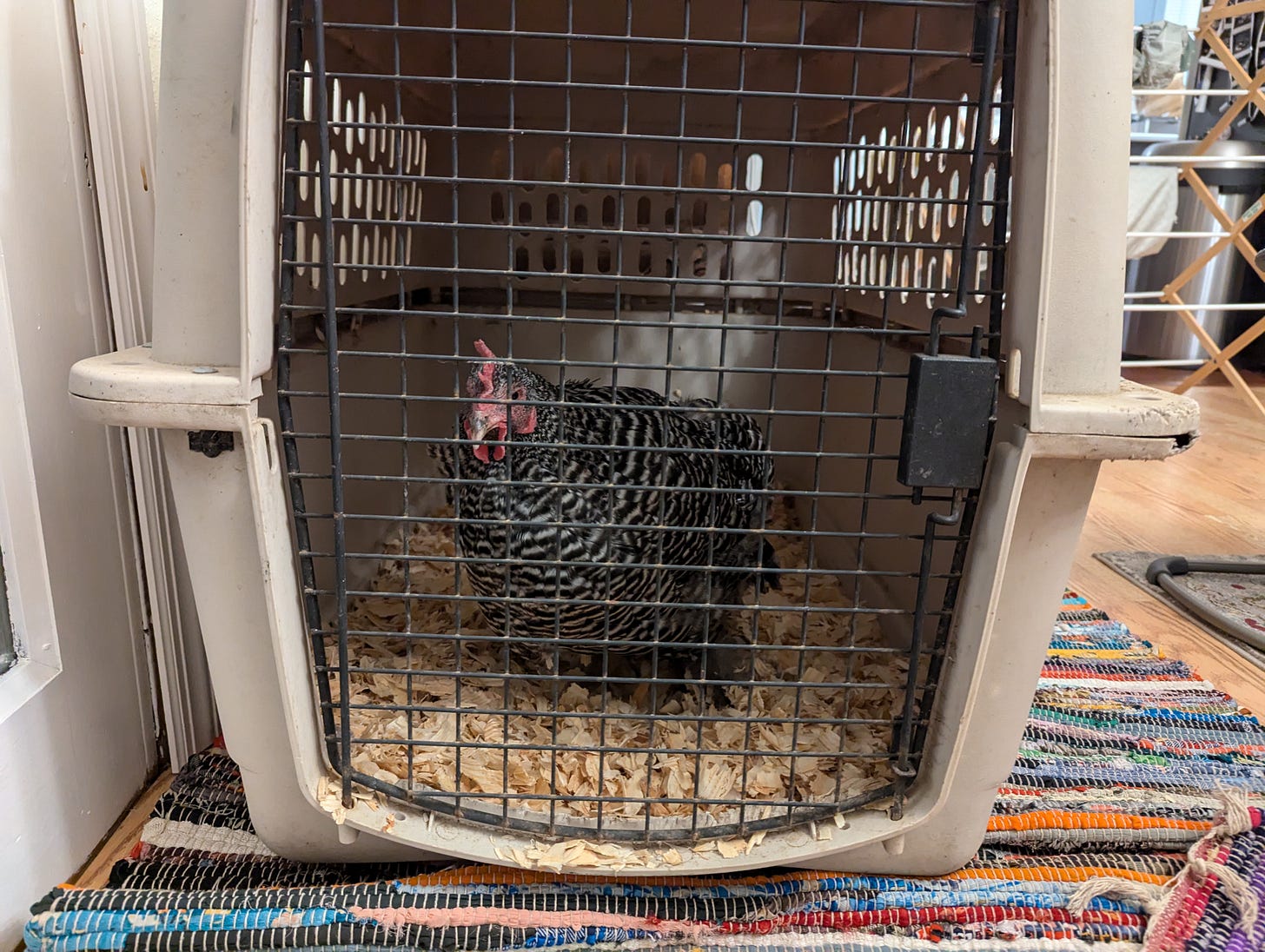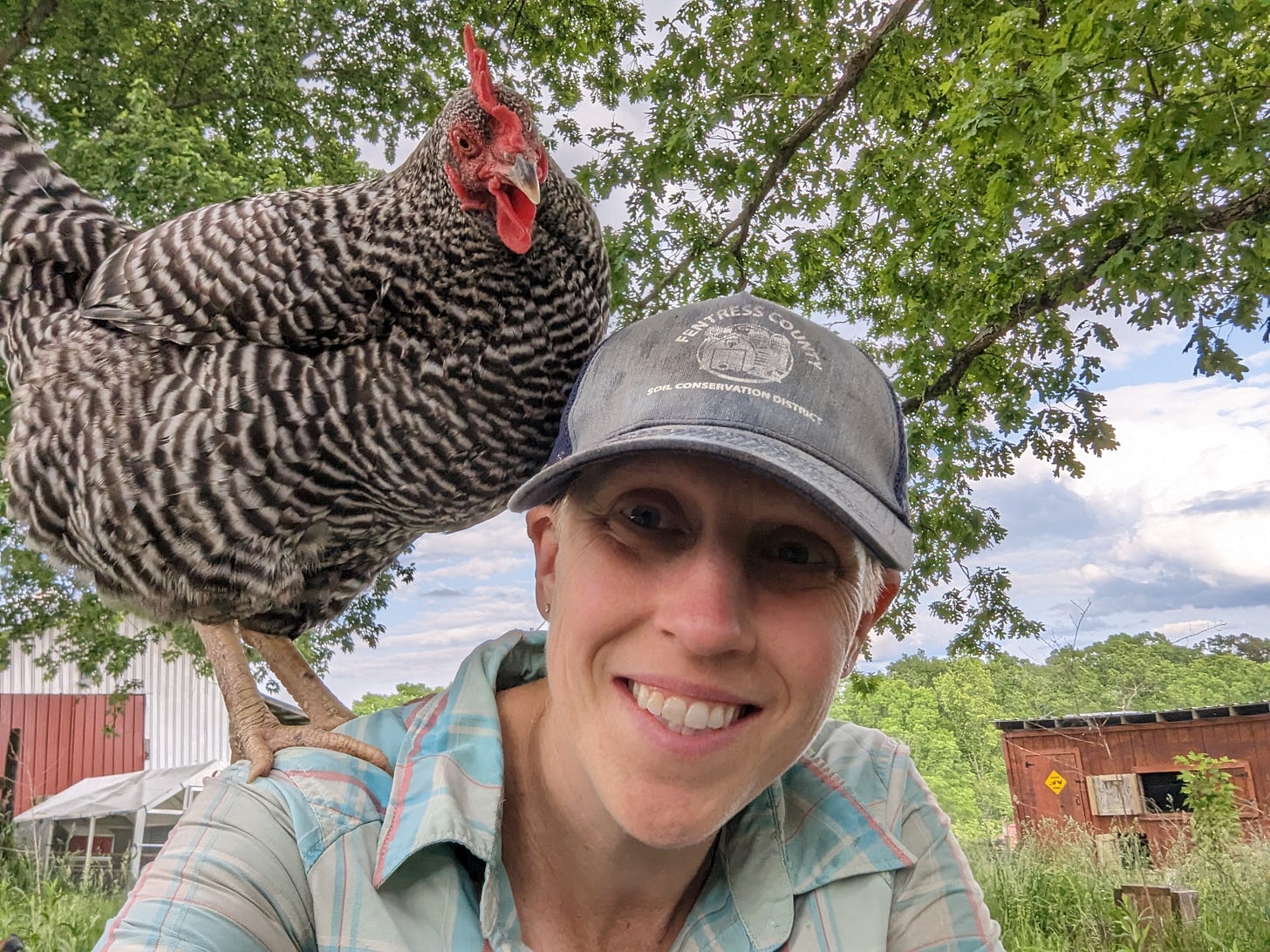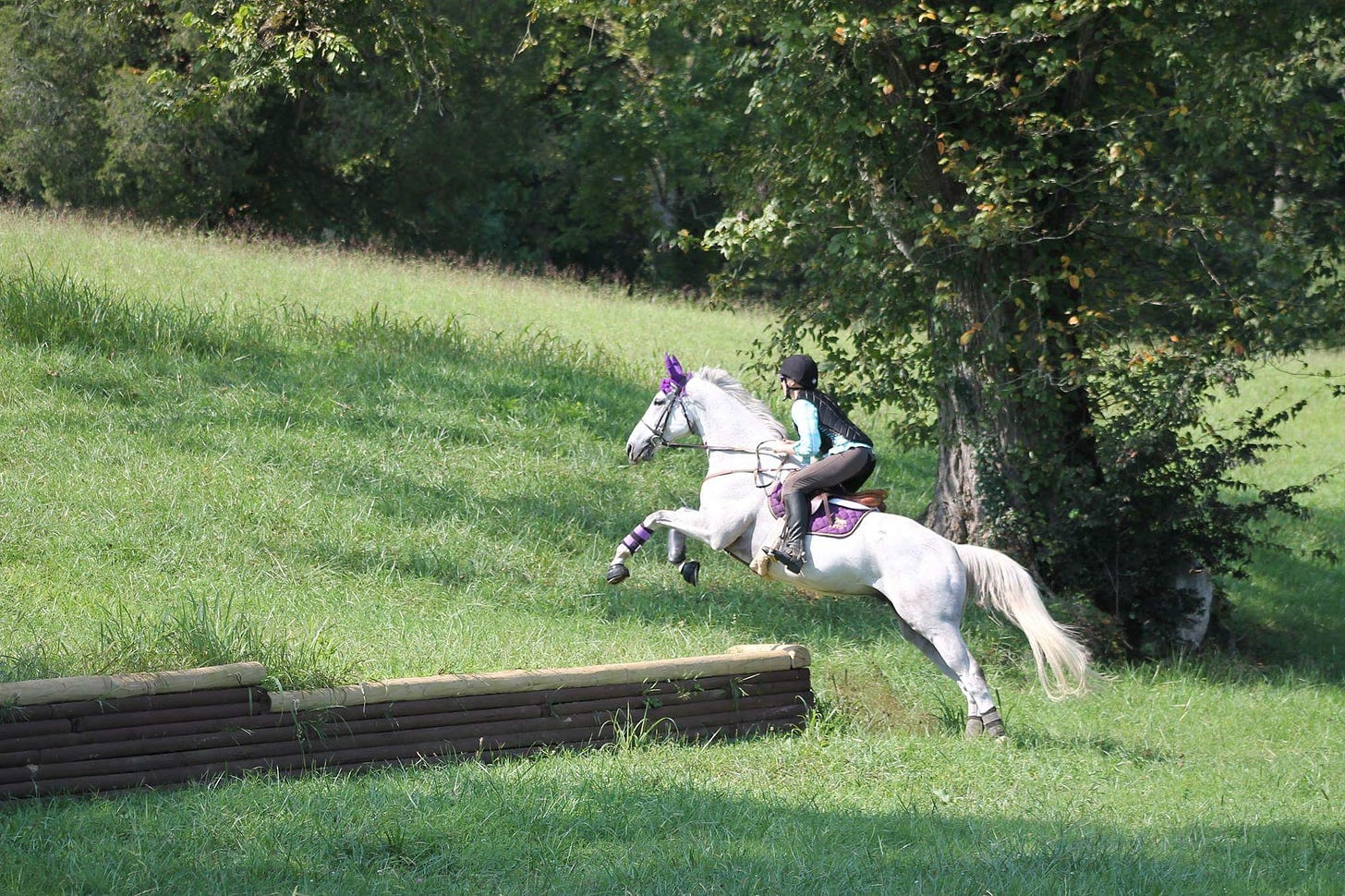No one, and I mean absolutely no one—yourself included—should ever underestimate you. You are capable. You are strong. You surpass every expectation.
— Ruthie, the Energizer Bunny of chickens
Here’s What’s Happening at Good Spirits Farm
As promised, I have another interview today. But first, an explanation on the star of today’s newsletter. As some of you may remember, Ruthie had such a hard winter recovering from a molt. She was so pathetic, we even brought her into the house (during the height of bird flu, with an infant in the house!), which is how you know I really love this chicken.
She’s also developed a chronic limp. I can’t see anything truly wrong with the leg, but this breed is quite, uh, robust, and one of her sisters clearly has arthritis, so I figured that was what was going on with Ruthie, too.
But then, the other day, we noticed her wobble had gotten much worse, and she wasn’t moving around much. I looked her over again (no local vets see chickens), and again, couldn’t see a break or a dislocation or a wound. I put her in isolation for a few days to rest up, as chickens can be very mean to each other, especially when they detect a weakness. (Just like humans.)
Just like this winter, I worried that this was the beginning of Ruthie’s end. And then, yesterday, I walked out to check on her and found she’d laid not one but TWO eggs in her little isolation ward. I figured Ruthie went through hen-o-pause years ago—she’s almost 7, which is the average lifespan for a chicken. Furthermore, weak chickens generally stop laying, as it’s an energy-intensive activity. This old gal just refuses to quit, and wow, do I love her for it. She’s clearly not ready to leave us anytime soon.
Today I have an interview with Dr. Meghan Kartley, a large animal and equine vet. Dr. Kartley was a hero when I had to put Ghost down last summer. It was a complicated event, because Ghost and Gin were so bonded—we needed to get Gin loaded onto the trailer to his new home at exactly the same time we were beginning to sedate Ghost. Leaving either alone for too long would have seriously stressed them out.
Vets are busy people, but Dr. Kartley arranged her schedule so she could pull in at exactly the same time the trailer for Gin pulled up. While I (then very pregnant at the time), worked with a friend on loading Gin, Dr. Kartley quietly got organized and gave Ghost his first round of sedation. Then, she waited patiently so I could say my goodbyes. It was a terrible day, but one that was made less stressful by her kindness.
A few weeks ago, I learned that Dr. Kartley had closed her practice here to move to a small animal clinic in Texas. Jamestown, Tennessee, has a huge horse population, but we’ve had trouble keeping farm vets. I wanted to ask her why. The interview below has been lightly edited for clarity and length.
ACS: I feel like a lot of the vets I know are the rare breed of person who actually ended up doing the thing they wanted to do when they were kids. Is that true for you?
MK: Oh, absolutely. That's exactly the story. In fact, my mom ran into my kindergarten teacher at the grocery store right after I graduated from vet school. She still remembered that I said I wanted to be a vegetarian and help animals, because I couldn't say veterinarian. With that being said, I was raised in the city. So, until I was in high school and got into horses, I did not even know there were equine veterinarians or large animal veterinarians.
ACS: You told me that it took you several tries to get into vet school. Why did you keep going?
MK: The first time I applied to Ohio State, the dean of the vet school asked me how far I drove to get to my interview, and then he told me I’d just wasted 3.5 hours of my life because I’d never be a vet.
ACS: Wow, what a shit thing to do. Why didn’t you give up?
MK: That actually made more like “I am going to do this one way or another.”
ACS: I'm so glad you did! What do you love most about being a vet?
MK: I love animals. I am the person who, if it rains, I won’t step on the worms on the sidewalk—I’ll throw them back in the grass. But I also love the science, I’ve always found that interesting. Most of all, I really love the human-animal bonds. I didn’t have the best childhood, but as a kid, that bond with animals was so, so important. And I really love the relationships you make with both animals and people. It’s the best of both worlds—you get to create connections with both humans and animals.
ACS: I feel like that is a little unique. A few other vets I know somewhat struggle with having to deal with humans all day.
MK: Honestly, I am a people person as well as an animal person. If it were financially feasible, I’d go to medical school.
ACS: That’s interesting. And the financially feasible thing is something I want to talk about, because I feel like a lot of people don’t understand the financial realities of being a large animal vet. Is it because the equipment you need is so much larger and therefore more expensive?
MK: It’s not even that. I think the large animal farm vet model is going to go extinct, and it’s not a matter of if, it’s a matter of when. It’s purely a matter of time: You only have so many minutes in the day, and the amount of time you spend traveling farm to farm—that’s time that in a small animal clinic you could be doing several procedures. Like where I am working now, I am booked for an animal every 30 minutes, but often I am actually double or triple booked. SoI am seeing three animals, four, five animals in an hour.
As a farm vet, to keep your costs reasonable so people can afford your services, you really can’t bill for drive time like you’d bill for procedures. But you graduate with the same amount of student debt as someone going into small animal. [ACS: Currently, the average amount of student debt a vet student graduates with is $179,505.]
But that’s only part of it. You also have to be available for emergencies. So your work-life balance becomes nonexistent. You’ll get home from a long day of seeing patients only to have your phone ring with an emergency. You’re never really off.
ACS: So for farmers like me, is the future going to be that if I have an animal in crisis, I need to either be prepared to haul it to a vet in a trailer?
MK: Absolutely.
ACS: I want to also talk about the mental health aspects of the work you do. I know that veterinarians have a suicide rate 2-4 times that of the general population. I am sure you have dealt with some difficult situations and seen animals treated in some pretty rough ways. What keeps you going?
MK: It’s that human-animal bond. When I was working in a rural area, sure, I’d see that farm dog that was covered in fleas. Maybe it’s not vaccinated, or neutered, or spayed. But it’s sharing Grandpa’s meal with him—like every meal--and they’re sitting together on the front porch. That dog is loved; you can tell that dog is that man’s life. And I try not to judge, because what one person thinks something should be is not always what another person does. I think that if we respected each other but tried to help each other with a healthy respect, that’s better than pointing fingers.
In my practice in Ohio, I had a lot of Amish clients. And I think that, because I didn’t judge them, that’s a big reason that they felt they could bring their animals to me. In the long run, I feel like I made a difference by educating the owners and helping the patient.
ACS: What keeps you going on the days that are really hard?
MK: You know, it’s crazy, I’ll have a really difficult case and then it’s followed by an uplifting case—like helping with a dystocia (assisting with a stuck baby during birth). I keep all of the thank-you cards I get. When I would go on emergency calls in the Amish community and after every emergency, there’d always be a baked good on the front seat of my car waiting for me. Being a part of a community, that keeps me going—and I felt like I was just getting to that point in Jamestown. It just didn’t make sense to stay there for a number of reasons.
ACS: Do you think you’ll ever come back to this area?
MK: Absolutely. I am holding onto my land there; I still love the area. But it has to make sense for me and my family to be there. Maybe when I retire.
(Gratuitous pic of Ghost, because this interview is making me think of him and how glad I am to have had a wonderful vet help him transition peacefully out of this world.)
Here’s What I Loved This Week
I have not had a recipe be this cheap, delicious and easy in a very long time. This okonomiyake (basically a ramen noodle frittata) recipe from the New York Times (gift link, so no subscription required!) was an absolute hit.
I added more veggies—sauteed bok choy and broccoli raab, because my garden is overflowing with both—and a couple of tablespoons of chile garlic sauce for heat, but otherwise made it exactly as written. Don’t be afraid of the flip, either, it’s not as hard as it sounds!








OMG, AC, I made the okonomiyaki recipe last night too! It was SO good. I've been anticipating the lunchtime leftovers all morning.
Thank you for sharing your interview , too. I've known there's been a concern about large vets in rural areas, but now I understand why. Dr. Kartley, sounds like you are a wonderful human!
Thank you so much for the recipe! I always have cabbage at home (because coleslaw is my go-to vege accompaniment when I get home late), and the recipe sized down very neatly for a single person. And virtual hugs to Ruthie from another senior who's hanging in there :)